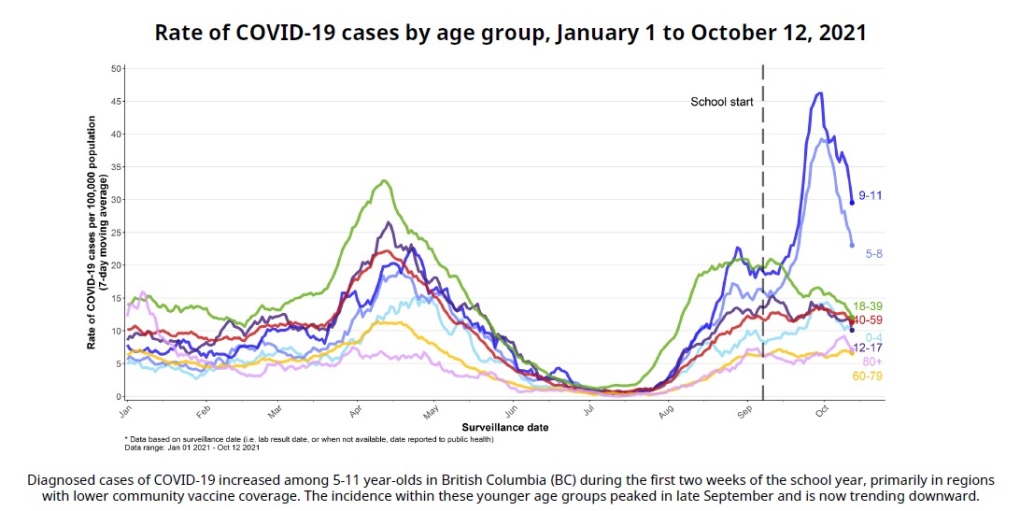Rate of COVID-19 cases among young B.C. children trending downward
The number of young children catching COVID-19 in British Columbia has decreased significantly since the end of September, according to new data released Tuesday.
The latest surveillance data, shared by provincial health officer Dr. Bonnie Henry, shows children between the ages of five and 11 are still being infected at a higher rate than other age groups in the province, but that the situation has improved significantly in recent weeks.
The last time the data was presented, a few weeks after the beginning of the school year, health officials were sounding the alarm about a "dramatic increase" in cases involving young children who are not yet eligible for vaccination.
"As case rates are coming down across the board, we've also seen, thankfully, a dramatic drop in case rates among school-aged, younger children," Henry said. "And we continue to see a low rate in the 12- to 17-year-olds, particularly in the areas where vaccination is high in that age group."
Late last month, the data showed children between the ages of nine and 11 were getting infected at a rate of about 46 cases per 100,000 population. That number has since dropped to just under 30 cases per 100,000 population.
Similarly, the rate of infection among children aged five to eight peaked at about 39 cases per 100,000 population in September, and has dropped to about 23 cases per 100,000 population.
Henry said the drops have been particularly pronounced in the Interior Health and Northern Health regions, which both saw higher rates of infection among school-aged children last month compared to the rest of the province.
Vaccination rates in both health authority regions are lagging behind other parts of B.C., and Henry noted the previous spike in cases among young children mirrored increases in the wider community.
Officials also revealed seven children were hospitalized with COVID-19 over the last week, including five in the "zero to four" age group. One was between the ages of five and 11 and one was between the ages of 12 to 17.
None of the young patients were admitted to intensive care, Henry said.

Some parents and teachers were anxious heading into the school year, particularly given the spread of the highly contagious Delta variant, and pressured the government to expand B.C.'s school mask to include all students from kindergarten through Grade 12. Previously, the mandate only applied to students in Grade 4 and above.
Henry acknowledged there has been an increase in transmission at schools, but noted the data still indicates most kids catch COVID-19 in other settings.
The provincial health officer presented school transmission data from Interior Health showing there have been 80 clusters at 46 schools in the region so far this semester.
"A total of 314 cases were linked to these clusters, which is about a quarter of the cases among that age group in the region," Henry said.
The median number of people involved in the clusters is three, compared to a median of two recorded last year.
"There is slightly increased transmission but it's mostly controlled," Henry said.
"We know there was a lot of anxiety going back into school this year, and it's important for us to provide this information as best we can so people know the situation."
Data on case rates among children and transmission in schools will be released by the B.C. Centre for Disease Control on a monthly basis going forward, officials said.
CTVNews.ca Top Stories

B.C. seeks ban on using drugs in 'all public spaces,' shifting approach to decriminalization
The B.C. government is moving to have drug use banned in 'all public spaces,' marking a major shift in the province's approach to decriminalization.
Orca calf that was trapped in B.C. lagoon for weeks swims free
An orca whale calf that has been stranded in a B.C. lagoon for weeks after her pregnant mother died swam out on her own early Friday morning.
Trump's lawyers try to discredit testimony of prosecution's first witness in hush money trial
Donald Trump's defence team attacked the credibility Friday of the prosecution's first witness in his hush money case, seeking to discredit testimony detailing a scheme between Trump and a tabloid to bury negative stories to protect the Republican's 2016 presidential campaign.
Sophie Gregoire Trudeau on navigating post-political life, co-parenting and freedom
Sophie Gregoire Trudeau says there is 'still so much love' between her and Prime Minister Justin Trudeau, as they navigate their post-separation relationship co-parenting their three children.
Air traveller complaints to Canadian Transportation Agency hit new high
The Canadian Transportation Agency has hit a record high of more than 71,000 complaints in a backlog. The quasi-judicial regulator and tribunal tasked with settling disputes between customers and the airlines says the backlog is growing because the number of incoming complaints keeps increasing.
More than 115 cases of eye damage reported in Ontario after solar eclipse
More than 115 people who viewed the solar eclipse in Ontario earlier this month experienced eye damage after the event, according to eye doctors in the province.
'I was scared': Ontario man's car repossessed after missing two repair loan payments
An Ontario man who took out a loan to pay for auto repairs said his car was repossessed after he missed two payments.
76ers All-Star centre Joel Embiid says he has Bell's palsy
Philadelphia 76ers All-Star centre Joel Embiid has been diagnosed with Bell’s palsy, a form of facial paralysis he says has affected him since before the play-in tournament.
U.S. flight attendant indicted in attempt to record teen girl in airplane bathroom
An American Airlines flight attendant was indicted Thursday after authorities said he tried to secretly record video of a 14-year-old girl using an airplane bathroom last September.































